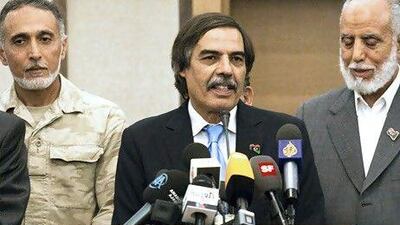Libya's oil industry lies in the hands of a former economics professor and long-time critic of the Qaddafi regime.
Industry insights What now for Libya?
Libya looks to past for future With the long conflict finally drawing to a close, the first task for Libya's rebel government is to restart the oil industry.Read article
UAE a much needed powerful ally As Libya rebuilds it is counting on the UAE for fuel, infrastructure experience and energy investment. Read article
Infighting at Opec opens up rifts The Libyan conflict exposed rifts between producers and consumer, and even within Opec. Read article
Dr Ali Tarhouni, the rebels' oil minister, must restructure and restart the industry that provided Libya with nearly all of its income before the six-month civil war.
He will have to coax back foreign oil companies, whose engineers evacuated at the start of the hostilities, as well as determine the future of the state oil company, which has been fractured since a Benghazi subsidiary defected to the rebels.
Dr Tarhouni will also have to fill the shoes of Shokri Ghanem, the former Opec envoy and chairman of the Libyan National Oil Corporation.
Mr Ghanem defected in May and threw his support behind the rebels, but he has not taken a position in the National Transitional Council, the rebel government.
Dr Tarhouni had spent three decades outside Libya when he returned to Benghazi in March to serve as the rebels' oil minister.
He left Libya in 1973 after calling for government reforms.
Eight years later, he was placed on a hit list, according to The New York Times.
By then he was part of the way through a doctorate in the US and soon after took a post as a senior lecturer in economics at the University of Washington in Seattle.
Teaching undergraduates microeconomics by day, Dr Tarhouni lived a shadow life planning for a post-Qaddafi Libya.
He tracked Libya's government revenue and its spending in the public sector, estimating that tens of billions of dollars had gone missing.
"With Qaddafi, as with any dictator, the object is to hide as much money for himself as quickly as possible," he told the Washington Report on Middle East Affairs in 1994. "I think he has done a remarkable job."
Dr Tarhouni's Libyan friends in Seattle would come to his house or meet in the nearby mountains to debate the nation's future.
He is optimistic about the prospects for a reformed government.
"Can a constitutional republic which includes indigenous elements survive in a tribal society like ours?" he told the Washington Report in 1994. "I think the chances are good."

